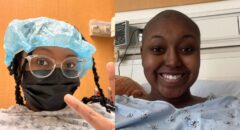
Inflammatory breast cancer (IBC) is rare and has some unusual warning signs that many women don’t realize can signal the disease. This unfortunately leads to 1 in 3 inflammatory breast cancer cases being diagnosed once the cancer has already metastasized (spread to distant parts of the body).
What are the symptoms of IBC?
Experts at the Ohio State University Comprehensive Cancer Center shared those symptoms, raising awareness about this aggressive and deadly type of breast cancer, which occurs more frequently in women younger than 40, Black women and women who are obese or overweight.
The symptoms of inflammatory breast cancer are similar to those of a breast infection. They include:
- Areas of discoloration (red, pink or purple), a bruise or rash spread over one-third of your breast.
- Dimpling, pitting or thickening of your breast skin that resembles an orange peel.
- Pain, swelling, itchiness, firmness or tenderness in one breast.
- Warmth, burning, heaviness or enlargement of one breast.
- Inverted or retracted nipple (a nipple that points inward).
- Swollen lymph nodes near your collarbone or under your arm.
“Women should know that radical changes to the breast are not normal, and breast self-exams are still very important. Some 50% of inflammatory breast cancers are diagnosed as stage 4 disease,” says Dr. Ko Un Park, a surgical oncologist who leads a new Inflammatory Breast Cancer Program at the center. “It is important for women to recognize changes in both the appearance and feel of their breasts so that changes can be discussed quickly with a physician.”
Inflammatory breast cancer can occur in any part of the breast. It can even be confusing for doctors who typically don’t think of a red breast as signaling cancer.
RELATED: Breast Self-Exam 101
A “sneaky disease”
“Although inflammatory breast cancer only represents 1% to 5% of all breast cancers in the United States, it is a sneaky disease and challenging to diagnose,” Park said in a cancer center news release. “It is critical that clinicians have a high level of familiarity with its subtle signs and be prepared to take immediate action to avoid belated diagnosis.”
Park and breast radiologist Dr. Amy Kerger are helping lead a team that will triage and rapidly respond to potential inflammatory breast cancer cases. The team is also working with primary care doctors and obstetricians/gynecologists to bring more awareness to this particular form of breast cancer.
“Our goal is to push these patients to the front of the line, rapidly mobilizing a treatment plan so that therapy can begin as soon as possible,” Park said.
When to see a doctor
Most of the symptoms of inflammatory breast cancer develop quickly — within three to six months. These symptoms can spread rapidly so it is important to see a doctor as soon as you notice any alarming symptoms.
You should also see your doctor if you’ve been diagnosed with a breast infection that isn’t responding well to treatment. He or she can get you tested for inflammatory breast cancer. A breast infection, such as mastitis, which typically occurs when you’re pregnant or breastfeeding, can cause some of the same symptoms as inflammatory breast cancer.
RELATED: 5 Reasons Black Patients Should Participate in Metastatic Breast Cancer Trials
Because there is usually no lump to feel during a physical exam or see during a mammogram, doctors may have a hard time coming to a diagnosis. To combat this, your doctor will exam your breast for any changes and order a biopsy if they suspect inflammatory breast cancer. In some cases, your doctor may also recommend additional imaging tests, such as an ultrasound or breast MRI.
After a diagnosis of inflammatory breast cancer, doctors will order more tests to collect information about the cancer’s characteristics. These tests, as well as the results of your biopsy and any imaging tests, make up the various parts of your pathology report, which will help determine what the best method of treatment will be, according to Breastcancer.org.
Treatments for IBC include chemotherapy, surgery, radiation therapy, targeted therapy, hormone therapy and immunotherapy. Your healthcare provider may also recommend that you participate in a clinical trial.
Unfourtanetly, IBC can not be prevented and because it spreads quickly and often recurs, the prognosis isn’t as good as other forms of breast cancer.
However, regular mammograms and self-exams can help you get diagnosed as early as possible and manage the condition as effectively as possible. So ladies if you haven’t checked your breasts out, this is your sign to do so!









